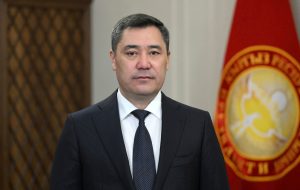On May 17, a video started to circulate on Kyrgyz social media depicting a fight between “foreigners” and Kyrgyz in the front yard of a hostel in the country’s capital, Bishkek. The following night angry crowds of mostly young men gathered in the city. Through the night they protested, blocking a major avenue and attacking dormitories housing students primarily from South Asia, injuring at least 41 people.
Much of the violence took place at the International University of Kyrgyzstan. The rector of the university, Asylbek Aidaraliev, said at a press conference on May 20 that people suddenly began to gather around 1 a.m. “They broke the windows, broke in through the back door, started running around the floors, knocking out doors, glass, taking money and iPhones,” he said.
Aidaraliev noted that the few police present when the attack began “stood there and didn’t take a single step. True, there were not many of them. Then, as I understood, they tried to intervene, but they were also beaten.”
He suggested that the events were pre-planned: “There was a fight on May 13, and everyone would have forgotten about it. But on May 17, people suddenly gather, for what reason is unclear.”
It was the largest protest action seen in Bishkek since the October 2020 protests that brought down the government of then-President Sooronbai Jeenbekov and catapulted Sadyr Japarov (and Kamchybek Tashiev) into power. Their rule has been characterized by populist posturing and nationalist rhetoric.
Early on May 18, as the crowd were attacking predominantly Pakistani students, Kyrgyz authorities said they had detained four Egyptians on hooliganism charges in relation to the fight that occurred on May 13 – the video of which set off the protests. Three of the Egyptian men were shown apologizing, but as additional reports emerged it became clear that all was not what it seemed.
According to the Kyrgyz Ministry of Internal Affairs, on May 13 a group of people – of “Asian appearance” – allegedly harassed a group of foreign students. The foreign students reportedly fled to their hostel but were followed. The pursuing group “went on a rampage and began entering different rooms and knocking down doors.” They used “force against the foreign citizens living there, they openly took possession of money and things” and fled when residents of the hostel began fighting back.
The Egyptians were released on May 20 to house arrest and the unnamed robbery suspects were detained.
As Chris Rickleton, writing for RFE/RL remarked: “It remains unclear if the predominantly young, male crowd that took to the streets would have felt any differently if they had known that context.”
A piece of further context worth noting is that on May 16 Kyrgyzstan’s State Committee for National Security (SCNS) reported that it had detained 28 Pakistani nationals for “working illegally” in a Bishkek sewing shop. A day earlier, Bishkek police said they had cracked down on more than 400 foreign students engaged in work as moped and motorcycle delivery drivers, citing traffic concerns.
On May 18, SCNS head Kamchybek Tashiev said that the main demands of the protesters are “to a certain extent correct.”
“Their main demands concerned an increase in the number of students and workers from Bangladesh, Pakistan, India, Egypt, and other countries. I believe that the demands of the guys who gathered yesterday are to some extent correct,” Tashiev said.
He went on pledge that the state would “strengthen the fight against illegal immigration.”
Bishkek has had a ban on protests in much of the capital – which has seen three protest-driven revolutions in 30 years – since March 2022. And Tashiev has been less gentle in his comments regarding protests aimed at controversial government decisions, such as a border deal with Uzbekistan.
Around 59,000 foreign students study in Kyrgyzstan’s universities, of which more than 28,000 study in medical schools, according to the Kyrgyz Ministry of Education. There are more than 12,000 Pakistani students and more than 14,000 from India.
At least 1,200 Pakistani students from the International University of Kyrgyzstan have reportedly left the country.
As RFE/RL reported, Deputy Education Minister Rasul Abazbek-uulu called the mass attacks on Pakistani and Indian students “a shameful” situation that “damages Kyrgyzstan’s image.”
The rector of the Kyrgyz State Medical Academy, Indira Kudaibergenova, said that 80 percent of her institution’s budget is generated by tuition paid by foreign students – only 20 percent comes from the state. Kudaibergenova appealed to Kyrgyz to view foreign students in light of their own children seeking to study abroad: “These are also someone’s children, only from Pakistan, India, China and so on… The Kyrgyz have never been evil, but have always been kind and sympathetic. Our children are also abroad. And imagine if they are treated poorly.”
On May 20, the government released a 15-minute video address in which President Sadyr Japarov addressed the protests, in which he admitted, “Yes, if law enforcement agencies had promptly taken action and disclosed their actions to the public in a timely manner, perhaps this would not have happened.” But he went on to claim, without citing evidence, that “other forces interested in aggravating the situation managed to take advantage of the incident.”
Like Tashiev, Japarov viewed the protesters’ demands – to stop illegal immigration – as correct, referring to the protesters as “patriotic youth.”
Still, he appealed to Kyrgyz to “try not to undermine our relations with the outside world, developing investments, tourism and at least our custom of hospitality… At the very least, we must remember that our sons and daughters who are abroad may face the same attitude.”

































